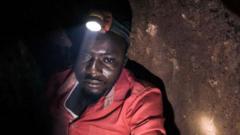The Democratic Republic of Congo (DR Congo) has initiated criminal proceedings against Apple in France and Belgium, claiming the tech company is involved in crimes related to its procurement of conflict minerals from its eastern regions, which are plagued by violence and illegal mining activities.
DR Congo Launches Legal Action Against Apple for Conflict Minerals Usage

DR Congo Launches Legal Action Against Apple for Conflict Minerals Usage
DR Congo accuses tech giant Apple of complicity in human rights violations linked to conflict minerals sourcing.
In a significant legal move, the Congolese government has filed complaints asserting that Apple's subsidiaries are knowingly using minerals such as tin, tantalum, and tungsten sourced from conflict zones controlled by armed groups. This reliance on "blood minerals," as the lawyers describe, allegedly funds ongoing violence while perpetuating child labor and environmental destruction.
Despite Apple's claims of stringent supply chain monitoring and a commitment to avoid conflict minerals, rights organizations have long raised concerns about the astonishing volumes of minerals reaching global markets from war-torn areas, with accusations that they may originate from mines managed by militias. The ongoing conflict and the demand for these precious minerals have exacerbated the dire humanitarian situation in DR Congo.
Lawyers representing the Congolese government outlined that the legal action aims to hold Apple accountable for its indirect support of these armed factions by purchasing minerals that originate from these hazardous areas. They urged an investigation into Apple's practices, given its prior assurance of ensuring responsible sourcing through audits and standards.
Meanwhile, Apple has reiterated its efforts in maintaining standards related to conflict minerals and has stated that it does not directly procure ore but ensures that the entire supply chain adheres to third-party audits that scrutinize mineral sourcing.
The conglomerate asserts that it has removed suppliers not compliant with ethical sourcing guidelines. Nevertheless, the accusations bring renewed scrutiny to the supply chain dynamics between the DR Congo, Apple, and the neighboring nations purportedly linked to this illicit mineral trade.
As the investigation unfolds, international observers will be keenly following how these allegations may influence not only DR Congo's governance but also alter corporate supply chain ethics in technology and beyond, highlighting the complex intersection of global demand for technology and the ethical implications of its sourcing.
The response from Apple as well as the ruling from French and Belgian authorities on this matter will shed light on how major corporations can be held responsible for supply chain practices that extend beyond national borders, particularly in regions with histories of human rights violations linked to resource extraction.
Despite Apple's claims of stringent supply chain monitoring and a commitment to avoid conflict minerals, rights organizations have long raised concerns about the astonishing volumes of minerals reaching global markets from war-torn areas, with accusations that they may originate from mines managed by militias. The ongoing conflict and the demand for these precious minerals have exacerbated the dire humanitarian situation in DR Congo.
Lawyers representing the Congolese government outlined that the legal action aims to hold Apple accountable for its indirect support of these armed factions by purchasing minerals that originate from these hazardous areas. They urged an investigation into Apple's practices, given its prior assurance of ensuring responsible sourcing through audits and standards.
Meanwhile, Apple has reiterated its efforts in maintaining standards related to conflict minerals and has stated that it does not directly procure ore but ensures that the entire supply chain adheres to third-party audits that scrutinize mineral sourcing.
The conglomerate asserts that it has removed suppliers not compliant with ethical sourcing guidelines. Nevertheless, the accusations bring renewed scrutiny to the supply chain dynamics between the DR Congo, Apple, and the neighboring nations purportedly linked to this illicit mineral trade.
As the investigation unfolds, international observers will be keenly following how these allegations may influence not only DR Congo's governance but also alter corporate supply chain ethics in technology and beyond, highlighting the complex intersection of global demand for technology and the ethical implications of its sourcing.
The response from Apple as well as the ruling from French and Belgian authorities on this matter will shed light on how major corporations can be held responsible for supply chain practices that extend beyond national borders, particularly in regions with histories of human rights violations linked to resource extraction.




















